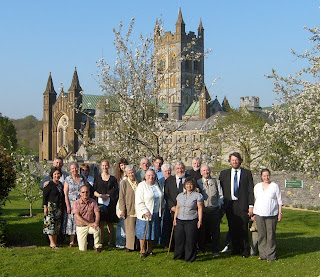Despite the fact we do not have an extensive advertising campaign and that ordinariate masses are not normally advertised by our local diocese (quite understandably) we frequently find a few folk have found their way to our mass at 3pm in Buckfast Abbey. Last Sunday was no exception. They are sometimes enquirers, sometimes catholics visiting the area, and sometimes someone just looking for a late mass. We are delighted to welcome them to our 'little mass'. Little of course only by virtue of our relatively small numbers, not little in the significance of celebrating the mass. Despite our small numbers we are pleased that eight people are currently being prepared for Reception; probably seven for the forthcoming triduum, and one other later. So I think despite being a small group in the Ordinariate we can be very pleased that the Lord is chosing to use us in this way for the glory of His name.
 |
| After our Reception last year - what joy! |
Sermon
Jesus leaves the
fishing town of Capernaum, the home of Peter, Andrew, James and John
to proclaim the Gospel to some of the most isolated families in the
whole country. Despite the fact that the people of Capernaum want Him
to stay, Jesus reaches out to these isolated family groups. And it is
here that Jesus comes across a man suffering from leprosy.
Leprosy was a terrible
disease not just in the way it caused disfigurement and suffering,
but also in the way it separated sufferers from human community. The
Law of Moses contained detailed prescriptions of how a leprosy
sufferer is to be treated. It is clear once infected nothing could be
done except to separate the individual from the rest of the community
to prevent anyone else becoming infected by them. Of course it was
possible that it could be misdiagnosed, but only an examination by a
priest could result in the person being restored.
It seems likely that
Leprosy was transmitted to the Hebrews during their time in Egypt.
During the Exodus they brought it with them to the Promised Land.
At the time of Jesus,
lepers were forced to live far from the rest of the population. It is
interesting to note that in some of the writings of the Rabbis we
have, that leprosy was considered to be as difficult to heal as
raising a man from the dead. Indeed to have leprosy caused a
separation from human community that no doubt caused mourning for the
rest of one's family and community.
It was clearly a very
significant event in Jesus' ministry, that He should have healed
someone of their leprosy. In the very way our Lord heals the man, He
shows His Lordship over the situation. He touches
the man. Christ does not just say
“Be healed.” He reaches out to the man who had been suffering not
just the disease but a lack of human community. Despite the Law's
pronouncement that the sufferer of leprosy was unclean (and therefore
if anyone touched a leper they were unclean too) Jesus touches the
man, and heals him through touching him. The man would be received
back into his family and community as well as being delivered from
the terrible disease.
Our
Lord is clearly driven to proclaim to everyone the Gospel of the
Kingdom of God. This proclamation is not just for the towns, but also
for the isolated communities and families. But this drive of our Lord
is not just about getting a message of words out to people; what is
clear is that He wants as many people as possible to witness
the Kingdom of God. He travels around and wherever He is present not
only can one hear the Word of God, but one can witness the Kingdom of
God.
One
of the difficulties of us understanding this is because of the
translation of our Lord's words into the word “Kingdom”. The
phrase that Jesus actually uses is not so much to do with territory
(as we usually understand kingdom to be) as to do with an active
doing word: the active reign of God, the active Lordship of the King.
Jesus is saying that God is actually sovereign now: God exists, and
God is really God. Jesus is saying, that God is acting now – this
is the hour when God is showing Himself in history as its Lord, as
the living God, in a way that goes beyond anything
seen before.
Despite
Jesus' request that the man not speak about it to others, it is clear
the man could not help himself telling everyone about this man Jesus.
The man had been dramatically changed by the sovereign Lord. Where
Christ is, there is the Kingdom of God, the active sovereign Lordship
of God.
As
we prepare ourselves for the keeping of Lent in ten day's time, let
us examine our lives and ask ourselves, whether people could see in
us evidence of the
Lordship of God. If we find the evidence somewhat lacking, we could
do worse than approach our Lord as the man with leprosy did. He
approached on his knees and with complete confidence said, “If you
will, you can make me clean.” May our keeping of Lent be
characterised with such humility and faith.
This comment has been removed by a blog administrator.
ReplyDelete